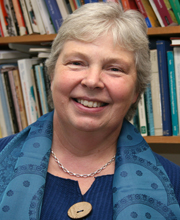Professor Helen Wilcox
Emeritus Professor, PhD Supervisor

Research
My research concentrates on three main areas of early modern English literature: (1) devotional writing, particularly lyric poetry; (2) Shakespeare, particularly the tragicomedies; (3) early women’s writing, particularly poetry and autobiography.
My work on devotional writing focuses on the religious poetry and prose written in English in the seventeenth century, a time of intense dilemmas over devotional identity. I have published many articles on the work of writers such as John Donne, Aemilia Lanyer, George Herbert, An Collins, Henry Vaughan, ‘Eliza’ and their contemporaries. My annotated edition of The English Poems of George Herbert was published by Cambridge University Press in 2007 (paperback, 2011) and has been highly acclaimed by fellow-scholars and general readers alike. More recently I co-edited The Oxford Handbook of Early Modern English Literature and Religion (Oxford University Press, 2017) with my Bangor colleague, Andrew Hiscock. My Shakespeare studies centre on his tragicomedies: that is, his so-called ‘problem plays’ and the romances. These plays are particularly fascinating for their alternative solutions to the challenges of tragedy and comedy, and for their female roles. I have published several essays in the field of gender and genre in Shakespeare, and my Arden 3 edition of All’s Well That Ends Well, co-edited with Suzanne Gossett, is due out in 2018. I also have a long-standing interest in early modern women’s writing, and one of my first books was the co-edited anthology of seventeenth-century women’s autobiographical writings, Her Own Life (1989), which is still in print and seen as a pioneering work in the field. I have also published Women and Literature in Britain, 1500-1700 (1996) and numerous articles on seventeenth-century women authors, raising questions of identity, voice, wit and religion. I contributed the chapter on the early modern period to the Cambridge History of Feminist Literary Criticism.
It will be clear that these three main areas of interest overlap considerably, since the women’s writing on which I work includes many devotional texts, and my focus on Shakespeare highlights issues of gender. They are also linked by certain recurring issues: the definition of genres (lyric, tragicomedy, autobiographical writing); the nature of early modern communities (held together by religious belief, literary allegiances, gender, or family), and the prevailing question of identity in the early modern period. Since none of this research can be carried out on literary works in isolation, the relationships between literature, history, religion, music and the visual arts form the vital interdisciplinary context of my work. This inter-relation of literature (by women and men), music, devotional experience and political contexts is central to my monograph, 1611: Authority, Gender and the Word in Early Modern England (Wiley-Blackwell, 2014).
Contact Info
- Email: helen.wilcox@bangor.ac.uk
Research areas and keywords
Keywords
- PR English literature - Renaissance, devotional literature, women's writing, editing, music and literature
Education / academic qualifications
- 1984 - DPhil , The Reputation and Influence of George Herbert to 1715
- 1976 - BA , English Language and Literature
Research outputs (34)
- Published
All's well that ends well
Research output: Book/Report › Book › peer-review
- Published
The Oxford Handbook of Early Modern English Literature and Religion
Research output: Book/Report › Book › peer-review
- Published
Community-Making in Early Stuart Theatres: Stage and Audience
Research output: Book/Report › Book
Prof. activities and awards (1)
Royal Society of Literature (External organisation)
Activity: Membership › Membership of network

